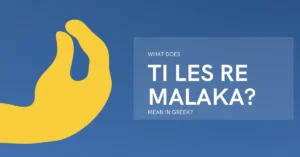Simple Greek Phrases: Learning a new language is an exciting adventure, and Greek is no exception. As one of the oldest languages in the world, Greek has a rich history and cultural significance, making it a fascinating language to study. Whether you’re planning a trip to Greece, connecting with Greek-speaking friends, or simply exploring a new linguistic challenge, mastering a few basic phrases will help you get started.
Essential Phrases, Greetings, and More for Travelers

In this guide, we’ll cover essential Greek greetings, polite expressions, self-introductions, numbers, and practical examples to help you build confidence in your first conversations.
1. Greetings: Saying Hello and Goodbye
Greetings are the foundation of any language, and Greek is no different. Here are some essential phrases to start conversations:
- Good Morning: Καλημέρα (Kaliméra)
- Pronunciation: Kah-lee-MEH-rah
- Good Evening: Καλησπέρα (Kalispéra)
- Pronunciation: Kah-lee-SPEH-rah
- Good Night: Καληνύχτα (Kalinýchta)
- Pronunciation: Kah-lee-NEEKH-tah
- Hello / Hi (Informal): Γειά σου (Yasou)
- Pronunciation: YAH-soo
- Hello (Formal/Plural): Γειά σας (Yasas)
- Pronunciation: YAH-sahs
- Goodbye: Αντίο (Adío)
- Pronunciation: Ah-DEE-oh
Cultural Tip: Greeks are warm and expressive, so don’t be surprised if greetings come with a handshake, hug, or even a kiss on both cheeks among friends.
2. Basic Responses: Yes and No
Knowing how to agree or disagree is crucial in conversations:
- Yes: Ναι (Ne)
- Pronunciation: Neh
- No: Όχι (Óchi)
- Pronunciation: OH-hee
Example Usage:
- Θέλεις καφέ; (Do you want coffee?) – THEH-lees kah-FEH?
- Ναι, ευχαριστώ! (Yes, thank you!) – Neh, ef-khah-rees-TOH!
- Όχι, ευχαριστώ. (No, thank you.) – OH-hee, ef-khah-rees-TOH.
3. Polite Phrases: Manners Matter
Politeness is highly valued in Greek culture. Here are key phrases to show respect:
- Thank You: Ευχαριστώ (Efcharistó)
- Pronunciation: Ef-khah-rees-TOH
- Please: Παρακαλώ (Parakaló)
- Pronunciation: Pah-rah-kah-LOH
- Excuse Me / Sorry: Συγνώμη (Signómi)
- Pronunciation: See-GHNO-mee
- I’m Sorry (Apology): Λυπάμαι (Lipáme)
- Pronunciation: Lee-PAH-meh
Example Dialogue:
- Παρακαλώ, μπορείτε να με βοηθήσετε; (Please, can you help me?) – Pah-rah-kah-LOH, boh-REE-teh nah meh voh-ee-THEE-seh-teh?
- Ναι, φυσικά! (Yes, of course!) – Neh, fee-see-KAH!
- Ευχαριστώ πολύ! (Thank you very much!) – Ef-khah-rees-TOH poh-LEE!
- Παρακαλώ! (You’re welcome!) – Pah-rah-kah-LOH!
4. Introducing Yourself: Making Connections
Introducing yourself is a great way to start conversations. Here’s how:
- My name is… – Με λένε… (Me léne…)
- Pronunciation: Meh LEH-neh…
- What’s your name? – Πώς σε λένε; (Pós se léne?)
- Pronunciation: Pohs seh LEH-neh?
- Nice to meet you! – Χαίρω πολύ! (Héro polí!)
- Pronunciation: HEH-roh poh-LEE!
Example Introduction:
- Γειά σου! Με λένε Άννα. Πώς σε λένε; (Hi! My name is Anna.) – YAH-soo! Meh LEH-neh AH-nah. Pohs seh LEH-neh?
- Γειά σου, Άννα! Με λένε Νίκος. Χαίρω πολύ! (Hi, Anna! My name is Nikos. Nice to meet you!) – YAH-soo, AH-nah! Meh LEH-neh NEE-kos. HEH-roh poh-LEE!
5. Numbers in Greek: Counting Basics
Numbers are essential for shopping, ordering, and telling time. Here’s 1-10:
| Number | Greek | Pronunciation | Phonetic |
|---|---|---|---|
| 1 | Ένα | Éna | EH-nah |
| 2 | Δύο | Dýo | THEE-oh |
| 3 | Τρία | Tría | TREE-ah |
| 4 | Τέσσερα | Téssera | TEH-seh-rah |
| 5 | Πέντε | Pénte | PEN-teh |
| 6 | Έξι | Éxi | EH-ksee |
| 7 | Επτά | Eptá | ep-TAH |
| 8 | Οκτώ | Októ | ok-TOH |
| 9 | Εννέα | Ennéa | en-EH-ah |
| 10 | Δέκα | Déka | THEH-kah |
Practical Use:
- Θα ήθελα δύο καφέδες, παρακαλώ. (I would like two coffees, please.) – Tha EE-theh-lah THEE-oh kah-FEH-thes, pah-rah-kah-LOH.
- Πόσο κάνει; (How much does it cost?) – POH-soh KAH-nee?
- Είναι πέντε ευρώ. (It’s five euros.) – EE-neh PEN-teh ev-ROH.
You might love …




